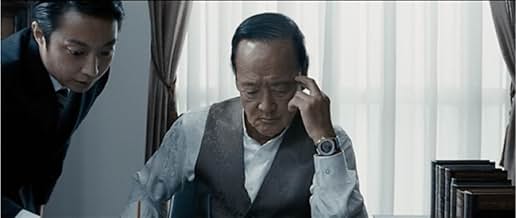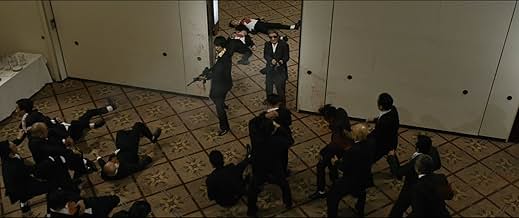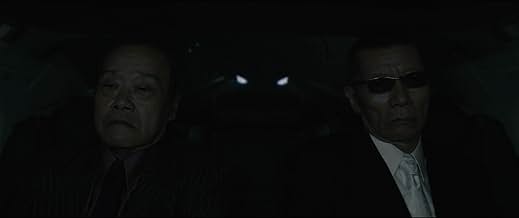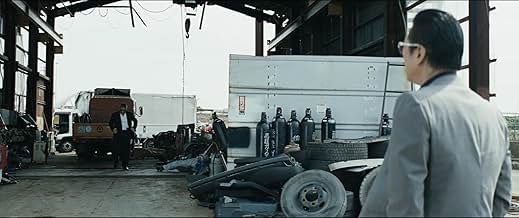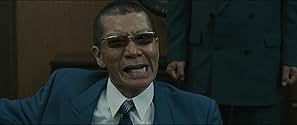Outrage Coda
- 2017
- 1h 44min
VALUTAZIONE IMDb
6,4/10
3786
LA TUA VALUTAZIONE
Cinque anni dopo essere sopravvissuto alla guerra totale tra le famiglie criminali Sanno e Hanabishi, l'ex capo della yakuza Otomo ora lavora in Corea del Sud per il signor Chang.Cinque anni dopo essere sopravvissuto alla guerra totale tra le famiglie criminali Sanno e Hanabishi, l'ex capo della yakuza Otomo ora lavora in Corea del Sud per il signor Chang.Cinque anni dopo essere sopravvissuto alla guerra totale tra le famiglie criminali Sanno e Hanabishi, l'ex capo della yakuza Otomo ora lavora in Corea del Sud per il signor Chang.
- Premi
- 2 vittorie e 4 candidature totali
Takeshi Kitano
- Otomo
- (as Beat Takeshi)
Recensioni in evidenza
Outrage Coda is a violent but unsatisfying end to the Outrage Trilogy. The main problem is that Takeshi Kitano's Otomo is barely in it and little time is given to his story/motivations. As a result, when he goes on his climatic rampage (that's not a spoiler if you've seen the Outrage films -- He always goes on a rampage), you don't care because the film hasn't built it up properly. The rest of the major characters are all very superficially drawn and equally evil, so it's tough to care about who is doing what to whom during the convoluted schemes. The ending seems like it was supposed to be very moving, but is more likely to leave you going, "huh?"
That said, I strongly recommend you watch this immediately after watching the first 2 films. At the very least, Kitano's character's lingering resentment from those films may carry over and round out his character in this film.
That said, I strongly recommend you watch this immediately after watching the first 2 films. At the very least, Kitano's character's lingering resentment from those films may carry over and round out his character in this film.
Truly a great experience for me, a well made trilogy with its intense storytelling and raw and brutally show cased characters and events. It maintains it quality as a gangster movie even though it is a bit low comparing to both first and second part. It is a bit rushed comparing to first two parts of the movie, but it doesn't effect the overall outlook of the movie. Brilliantly written turns and events literally goes through deep politics of Yakuza gang. What makes this trilogy different from other gangster movies are the realistic approach to the movie that seems more natural but also brutally portrayed violence. This trilogy is poetically raw and brutal, in a sense one who watching the movie may think that Takeshi is enjoying killing people brutally and honestly. This movie, in my opinion, can be seen as the true and well made representation of Gangsters and the unpredictability nature and politics, rivalry and violence among them. First part of the movie Outrage (2010) is a well made film with its poetical representation of gangsters and mob war. First part of the movie is then followed by second part which named Beyond outrage (2012) which maintains and improves what the first part had done. Must watch movie if you desired to watch a movie about gangsters, true and natural representation they got without any over the top events or exaggerations.
The first Outrage movie was an all-out extremely violent yakuza gang movie, with traces of humor and dialogues. A popcorn movie, but still satisfying to watch.
The second Outrage movie built a more intricate set-up and story, that justified the 2nd half of the film scenes.
The third and final part, Coda, is about the clash between traditional / old-school yakuza versus modern, petulant yakuza.
It's about honor and respect of the code versus greed, constant betrayal and perversity.
The movie features better written dialogues than in the previous two parts, and an interesting take on how modern society might affect yakuza businesses.
Kitano's character, Otomo, follows the traditional code of honor of the yakuza, to the end. It was a beautiful story.
Note that the scenario doesn't actually consider the modern spirit to be negative in all circumstances: Otomo's boss, Chang, is a business man who has embraced modernity, and who does not condone violence.
Kitano delivered an amazing trilogy.
The second Outrage movie built a more intricate set-up and story, that justified the 2nd half of the film scenes.
The third and final part, Coda, is about the clash between traditional / old-school yakuza versus modern, petulant yakuza.
It's about honor and respect of the code versus greed, constant betrayal and perversity.
The movie features better written dialogues than in the previous two parts, and an interesting take on how modern society might affect yakuza businesses.
Kitano's character, Otomo, follows the traditional code of honor of the yakuza, to the end. It was a beautiful story.
Note that the scenario doesn't actually consider the modern spirit to be negative in all circumstances: Otomo's boss, Chang, is a business man who has embraced modernity, and who does not condone violence.
Kitano delivered an amazing trilogy.
I recently watched Outrage Coda (2017) on Prime. The storyline follows Otomo, who is now living in Korea, laying low years after his street wars in Japan. He works for a new boss in Korea, who begins to stir up trouble with some of Otomo's old associates in Japan. Otomo is forced to return to Japan to settle the score with old enemies and conduct business for his employer.
This film is written, directed by, and stars Takeshi Kitano (The Blind Swordsman: Zatoichi), with supporting performances by Hakuryû (Violent Cop), Kanji Tsuda (Ju-on: The Grudge), Ren Ôsugi (Shin Godzilla), and Hiroyuki Ikeuchi (Ip Man).
These films consistently excel in their attention to detail with attire, settings, props, and casting-capturing the look and mannerisms that immerse you in the yakuza world. I always enjoy these movies. The violence is sudden, intense, and a lot of fun. The dialogue strikes a perfect balance between intense and humor, with some sharp one-liners. As the film unfolds, there are some great kills that keep you engaged through the final moments. There's a lot to appreciate here.
In conclusion, Outrage Coda is another fantastic entry in the yakuza series and an absolute must-see. I'd give this a solid 7/10 and highly recommend all three films in the series.
This film is written, directed by, and stars Takeshi Kitano (The Blind Swordsman: Zatoichi), with supporting performances by Hakuryû (Violent Cop), Kanji Tsuda (Ju-on: The Grudge), Ren Ôsugi (Shin Godzilla), and Hiroyuki Ikeuchi (Ip Man).
These films consistently excel in their attention to detail with attire, settings, props, and casting-capturing the look and mannerisms that immerse you in the yakuza world. I always enjoy these movies. The violence is sudden, intense, and a lot of fun. The dialogue strikes a perfect balance between intense and humor, with some sharp one-liners. As the film unfolds, there are some great kills that keep you engaged through the final moments. There's a lot to appreciate here.
In conclusion, Outrage Coda is another fantastic entry in the yakuza series and an absolute must-see. I'd give this a solid 7/10 and highly recommend all three films in the series.
This whole trilogy did not impress me at all. Takeshi performs as good as always and the rest of the cast was good also. But generally, all three movies looked flat to me. I love a ton of shooting and a lot of yelling, but these three movies look like a ton of shooting and yelling, and not much of anything else. I reckon Takeshi wanted to make simply an entertaining film, that would probably be enjoyed by mainly Japanese audiences.
The plot in all three movies is basically the same. Yakuza families trying to rise above other Yakuza families. After each dead, a Yakuza family seeks revenge against another family. All of them plot against each other. That's it.
Looks like Takeshi was bored to think of a more interesting plot. I don't know..Some twists in it maybe could help. Some more of that dark humor present here and there would also help. But unfortunately, the overall taste left on me after watching all three movies, is that there is nothing to remember afterwards. At some point even the background music looks like it is totally out of place.
Regarding positives, the actors who played the Yakuza bosses and underbosses all play their parts well. And there are scenes with subtle black humor that made me laugh genuinely. Lastly, these movies do show the vanity of the gangster universe. Sure you can rise to the highest peak in a crime syndicate, but at the end of the day you are nothing but an expendable tool yourself. And each passing day only brings your downfall closer.
I would keep the best ideas from all three movies and i would think of a better plot for a single movie. Three movies with so many similarities between them, for me this is kind of an overkill.
Not among Takeshi's best.
The plot in all three movies is basically the same. Yakuza families trying to rise above other Yakuza families. After each dead, a Yakuza family seeks revenge against another family. All of them plot against each other. That's it.
Looks like Takeshi was bored to think of a more interesting plot. I don't know..Some twists in it maybe could help. Some more of that dark humor present here and there would also help. But unfortunately, the overall taste left on me after watching all three movies, is that there is nothing to remember afterwards. At some point even the background music looks like it is totally out of place.
Regarding positives, the actors who played the Yakuza bosses and underbosses all play their parts well. And there are scenes with subtle black humor that made me laugh genuinely. Lastly, these movies do show the vanity of the gangster universe. Sure you can rise to the highest peak in a crime syndicate, but at the end of the day you are nothing but an expendable tool yourself. And each passing day only brings your downfall closer.
I would keep the best ideas from all three movies and i would think of a better plot for a single movie. Three movies with so many similarities between them, for me this is kind of an overkill.
Not among Takeshi's best.
Lo sapevi?
- QuizThe meaning of coda for this movie can be seen as having 2 meanings: 1. the closing section of a musical composition / A few measures added beyond the natural termination of a composition. / concluding section of a musical or literary composition; something that rounds out, summarizes, or concludes / the concluding passage of a piece or movement, typically forming an addition to the basic structure. / an ending part of a piece of music or a work of literature or drama that is separate from the earlier parts / something that ends and completes something else 2. The honor code (of the Yakuza)
- ConnessioniFollows Outrage (2010)
I più visti
Accedi per valutare e creare un elenco di titoli salvati per ottenere consigli personalizzati
- How long is Outrage Coda?Powered by Alexa
Dettagli
- Data di uscita
- Paese di origine
- Sito ufficiale
- Lingue
- Celebre anche come
- 極惡非道最終章
- Luoghi delle riprese
- Aziende produttrici
- Vedi altri crediti dell’azienda su IMDbPro
Botteghino
- Lordo in tutto il mondo
- 11.983.269 USD
- Tempo di esecuzione
- 1h 44min(104 min)
- Colore
- Mix di suoni
- Proporzioni
- 2.35 : 1
Contribuisci a questa pagina
Suggerisci una modifica o aggiungi i contenuti mancanti

